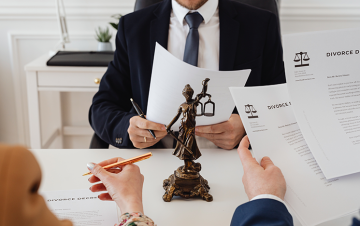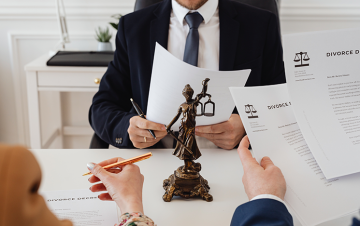Violation of privacy: legal support
A breach of privacy is defined as any situation where a person's personal information or private actions become available for public announcement or use without their consent. This may include unlawful interception of communications, unlawful access to personal records, unauthorized disclosure of personal information, or any other act that violates a person's right to privacy and personal freedom.
If you have become a victim of such a crime or are a suspect, a qualified lawyer specializing in this article will be able to provide you with the necessary legal support. Legal assistance in such cases is of critical importance for ensuring your legal security and effective protection of your interests.
Legal stages in case of illegal intrusion into privacy
The process of resolving this case has several key stages that help to provide legal assistance in the best possible way:
- Client consultation: The lawyer conducts a consultation with the client to gather information about the situation under Article 182 of the Criminal Code, to understand their rights and obligations, as well as to determine potential courses of action.
- Analysis of the case: The lawyer analyzes all the facts and evidence related to the case, including documents, testimony and other evidence.
- Preparation of documents: The lawyer prepares all necessary documents, such as a statement to law enforcement agencies or a court petition.
- Representation and protection of the client's interests: The lawyer acts as the client's representative during the investigation and legal process, protecting their rights and interests.
- Negotiations and mediation (if necessary): In some cases, the lawyer may negotiate with the other party or try to resolve the case through mediation without going to court.
- Appeal (if available): If the client is not satisfied with the court's decision, the lawyer can file an appeal and participate in the appeal process.
A thorough approach at each stage of the case is a guarantee of a successful resolution of the legal issue.
Under what conditions can a lawyer's service be provided in case of violation of a person's privacy?
It is important to know in which cases you can contact a lawyer, as well as under what conditions a lawyer can provide the service:
- Legality of the case: If the case or issue facing the client has a legal aspect and requires professional legal assistance, a lawyer can provide his services.
- Legal expertise: The Client may contact a lawyer for legal expertise on any matter related to the law, such as conclusion of agreements, disputes, tax issues, etc.
- Representation in court: A lawyer can provide representation services in court in cases of a civil, criminal, administrative or other nature.
Understanding the conditions for providing assistance will allow you to clearly determine when it is advisable to contact a lawyer to receive professional legal support.
Under what conditions can a lawyer's service not be provided in case of intrusion into a person's privacy?

Conflict of interest: If the provision of services would cause a conflict of interest for the lawyer, for example, if he already represents another party in the case or has confidential information that could affect the provision of objective help.

Insufficient qualifications: When a lawyer does not have sufficient qualifications or experience to provide services in a particular area of law or situation.

Illegal activity: A lawyer cannot provide services that are contrary to the law or moral norms, for example, by violating ethical rules or participating in criminal activities.
How to independently understand issues of illegal intrusion into a person's privacy?
Independently analyzing the issue can be a difficult task, but sometimes it is possible with the availability of some resources and approaches:
- Use online resources: The Internet is an excellent source of information on legal matters. Use reputable sites, such as those of government agencies, universities, bar associations, or human rights organizations.
- Read laws and regulations: You can find the text of laws, rules, and regulations that apply to your case on government websites or legal information databases.
- Research court decisions: Searching for court decisions that deal with similar situations can help you understand how courts interpret the law in your area.
- Use supporting materials: Books, magazines, articles and other sources can explain complex aspects of the law and provide practical advice.
- Consult with a professional: If you have a question or situation that you cannot resolve on your own, consult with a professional lawyer or legal advisor.
Resolving legal issues independently can be difficult, but with the help of the above steps, you can get a general understanding of your situation. However, in case of difficulties, it is better to contact an experienced lawyer who will provide the right strategy and maximum result.
Common questions regarding violation of a person's privacy
Question
Can my personal data be stored without my consent?
Answer
According to many data protection laws, personal data can only be stored with your consent or within the framework of exceptions provided by law.
Question
Can someone invade my privacy, for example by intercepting my emails or following me without my consent?
Answer
No, illegally intercepting your communications or tracking you without your consent can be a violation of your privacy and privacy.
Question
What rights do I have if my right to privacy has been violated?
Answer
You have the right to contact law enforcement or a court to protect your privacy. Also, depending on the specific circumstances, you may be entitled to compensatory damages or other relief.
What does the cost of a lawyer's services under Article 182 of the CCU depend on?
The price may depend on several factors. This is the complexity and scope of the case, the need for additional legal research, as well as the lawyer's participation in court sessions. In addition, the cost of the service may vary depending on the lawyer's experience, his qualifications, as well as the urgency of resolving the case. Other important aspects include the degree of confidentiality and the scope of work, which includes consultations, drafting documents or representation in court.
ConclusionIn resolving cases related to criminal offenses under Article 182 of the Criminal Code of Ukraine, it is important to correctly assess the situation at all stages. From gathering information to representing you in court, a qualified lawyer will help you protect your interests to the fullest extent possible. Thus, the right approach to solving legal problems will help you deal with them effectively and with minimal costs.








































